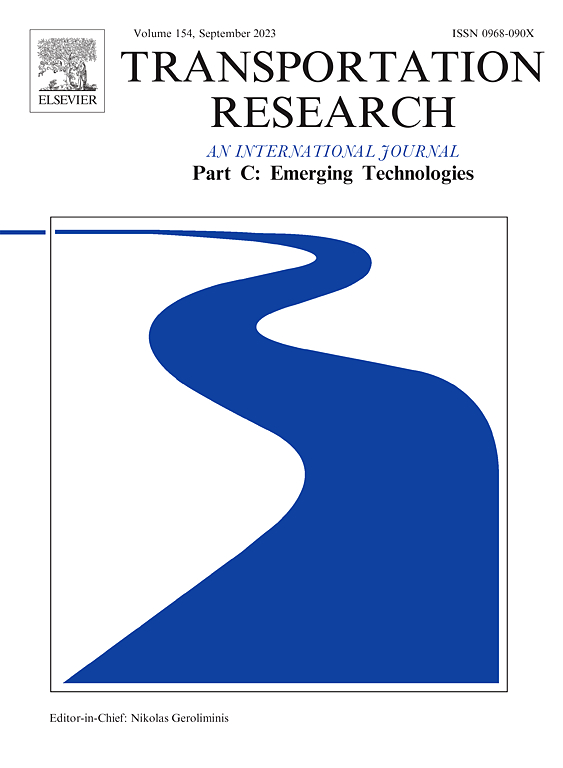为按需交付系统集成移动库存和车队管理
IF 7.6
1区 工程技术
Q1 TRANSPORTATION SCIENCE & TECHNOLOGY
Transportation Research Part C-Emerging Technologies
Pub Date : 2025-07-11
DOI:10.1016/j.trc.2025.105264
引用次数: 0
摘要
本研究介绍了一种优化框架,用于部署移动车队库存(mfi),以解决按需交付系统中运营效率低下的问题。传统上,这些系统依赖于固定设施来组织操作和管理资源。虽然固定设施提供了稳定性和结构性覆盖,但它们本质上是刚性的,难以适应城市服务需求的时空波动特征。通过利用城市水道,小额信贷机构充当了动态的移动设施,实现了实时资源再分配,并提供了更大的灵活性,以有效地满足不断变化的需求模式。我们将问题表述为一个混合整数线性规划模型,以优化MFI部署,最小化总系统成本。该模型结合了资本投资(如小额信贷机构租赁和对接基础设施)和运营费用(如乘客空闲时间)。关键决策包括确定最佳数量、小额信贷机构的位置和车队规模。为了验证这种方法,我们将其应用于阿姆斯特丹的一个送餐平台,证明了它的实用性和可扩展性。结果表明,与固定设施运行相比,实施mfi可将系统总体成本降低17%,并将驾驶员空闲时间减少35%。这些发现强调了小额信贷机构在提高城市环境中按需交付系统的效率、可持续性和适应性方面的变革潜力。本文章由计算机程序翻译,如有差异,请以英文原文为准。
Integrated mobile inventory and fleet management for an on-demand delivery system
This study introduces an optimization framework for deploying Mobile Fleet Inventories (MFIs) to address operational inefficiencies in on-demand delivery systems. Traditionally, these systems rely on stationary facilities to organize operations and manage resources. While stationary facilities provide stability and structured coverage, they are inherently rigid and struggle to adapt to the spatial and temporal fluctuations characteristic of urban service demand. By leveraging urban waterways, MFIs act as dynamic, mobile facilities, enabling real-time resource redistribution and offering greater flexibility to meet evolving demand patterns efficiently.
We formulate the problem as a mixed-integer linear programming model to optimize MFI deployment, minimizing total system costs. The model incorporates both capital investments (e.g., MFI leasing and docking infrastructure) and operational expenses (e.g., rider idle time). Key decisions include determining the optimal number, placement of MFIs, and fleet size. To validate the approach, we apply it to a meal delivery platform in Amsterdam, demonstrating its practicality and scalability. Results show that implementing MFIs reduces overall system costs by 17% and decreases rider idle time by 35% compared to stationary facility operations. These findings underscore the transformative potential of MFIs to enhance the efficiency, sustainability, and adaptability of on-demand delivery systems in urban settings.
求助全文
通过发布文献求助,成功后即可免费获取论文全文。
去求助
来源期刊
CiteScore
15.80
自引率
12.00%
发文量
332
审稿时长
64 days
期刊介绍:
Transportation Research: Part C (TR_C) is dedicated to showcasing high-quality, scholarly research that delves into the development, applications, and implications of transportation systems and emerging technologies. Our focus lies not solely on individual technologies, but rather on their broader implications for the planning, design, operation, control, maintenance, and rehabilitation of transportation systems, services, and components. In essence, the intellectual core of the journal revolves around the transportation aspect rather than the technology itself. We actively encourage the integration of quantitative methods from diverse fields such as operations research, control systems, complex networks, computer science, and artificial intelligence. Join us in exploring the intersection of transportation systems and emerging technologies to drive innovation and progress in the field.

 求助内容:
求助内容: 应助结果提醒方式:
应助结果提醒方式:


